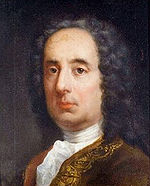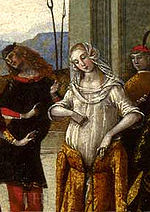
Griselda (Antonio Maria Bononcini)
Encyclopedia

Dramma per musica
Dramma per musica is a term which was used by dramatists in Italy and elsewhere between the late-17th and mid-19th centuries...
in three acts that was composed by Antonio Maria Bononcini
Antonio Maria Bononcini
Antonio Maria Bononcini was an Italian cellist and composer, the younger brother of the better-known Giovanni Battista Bononcini....
. The opera
Opera
Opera is an art form in which singers and musicians perform a dramatic work combining text and musical score, usually in a theatrical setting. Opera incorporates many of the elements of spoken theatre, such as acting, scenery, and costumes and sometimes includes dance...
uses a slightly revised version of the 1701 Italian libretto
Libretto
A libretto is the text used in an extended musical work such as an opera, operetta, masque, oratorio, cantata, or musical. The term "libretto" is also sometimes used to refer to the text of major liturgical works, such as mass, requiem, and sacred cantata, or even the story line of a...
by Apostolo Zeno
Apostolo Zeno
Apostolo Zeno was a Venetian poet, librettist, journalist, and man of letters.-Early life:Apostolo Zeno was born of Cretan Greek descent in Venice in 1669...
that was based on Giovanni Boccaccio
Giovanni Boccaccio
Giovanni Boccaccio was an Italian author and poet, a friend, student, and correspondent of Petrarch, an important Renaissance humanist and the author of a number of notable works including the Decameron, On Famous Women, and his poetry in the Italian vernacular...
's The Decameron
The Decameron
The Decameron, also called Prince Galehaut is a 14th-century medieval allegory by Giovanni Boccaccio, told as a frame story encompassing 100 tales by ten young people....
(X, 10, "The Patient Griselda"). The opera was dedicated to Prince Maximilian Karl von Löwenstein, the Austrian governor of Milan
Milan
Milan is the second-largest city in Italy and the capital city of the region of Lombardy and of the province of Milan. The city proper has a population of about 1.3 million, while its urban area, roughly coinciding with its administrative province and the bordering Province of Monza and Brianza ,...
, who died during the opera's world première on 26 December 1718 at the Teatro Regio Ducal
Teatro Regio Ducal
The Teatro Regio Ducal was the opera house in Milan from 26 December 1717 until 25 February 1776, when it was burned down following a carnival gala. Many famous composers and their operas are associated with it, including the premieres of Mozart's Ascanio in Alba, Mitridate, re di Ponto, and Lucio...
in Milan
Milan
Milan is the second-largest city in Italy and the capital city of the region of Lombardy and of the province of Milan. The city proper has a population of about 1.3 million, while its urban area, roughly coinciding with its administrative province and the bordering Province of Monza and Brianza ,...
. Nevertheless, Bononcini's opera was well received and enjoyed several revivals during the eighteenth century.
His brother, Giovanni Battista Bononcini
Giovanni Battista Bononcini
Giovanni Battista Bononcini was an Italian Baroque composer and cellist, one of a family of string players and composers. His father, Giovanni Maria Bononcini , was a violinist and a composer.-Biography:...
, wrote an even more popular version of his own
Griselda (Giovanni Bononcini)
Griselda is a dramma per musica in three acts that was composed by Giovanni Battista Bononcini. The opera uses a revised version of the 1701 Italian libretto by Apostolo Zeno that was based on Giovanni Boccaccio's The Decameron . The Italian poet Paolo Antonio Rolli was hired to revise the text...
to Zeno's libretto in 1722.
Roles
| Role | Voice type | Premiere cast 26 December 1718 |
|---|---|---|
| Griselda, wife of Gualtiero | coloratura Coloratura Coloratura has several meanings. The word is originally from Italian, literally meaning "coloring", and derives from the Latin word colorare . When used in English, the term specifically refers to elaborate melody, particularly in vocal music and especially in operatic singing of the 18th and... mezzo-soprano Mezzo-soprano A mezzo-soprano is a type of classical female singing voice whose range lies between the soprano and the contralto singing voices, usually extending from the A below middle C to the A two octaves above... |
Aurelia Marcello |
| Gualtiero, King of Thessaly | contralto Contralto Contralto is the deepest female classical singing voice, with the lowest tessitura, falling between tenor and mezzo-soprano. It typically ranges between the F below middle C to the second G above middle C , although at the extremes some voices can reach the E below middle C or the second B above... (originally a castrato Castrato A castrato is a man with a singing voice equivalent to that of a soprano, mezzo-soprano, or contralto voice produced either by castration of the singer before puberty or one who, because of an endocrinological condition, never reaches sexual maturity.Castration before puberty prevents a boy's... ) |
Domenico Tempesti |
| Roberto, brother of Corrado | soprano (originally a castrato) | Eleonora Scio |
| Corrado, Prince of Puglia | tenor Tenor The tenor is a type of male singing voice and is the highest male voice within the modal register. The typical tenor voice lies between C3, the C one octave below middle C, to the A above middle C in choral music, and up to high C in solo work. The low extreme for tenors is roughly B2... |
Giovanni Battista Pinacci |
| Costanza, missing daughter of Griselda and Gualtiero | contralto | Agata Landi |
| Ottone, a Sicilian nobleman | bass | Luca Mingoni |
Synopsis


